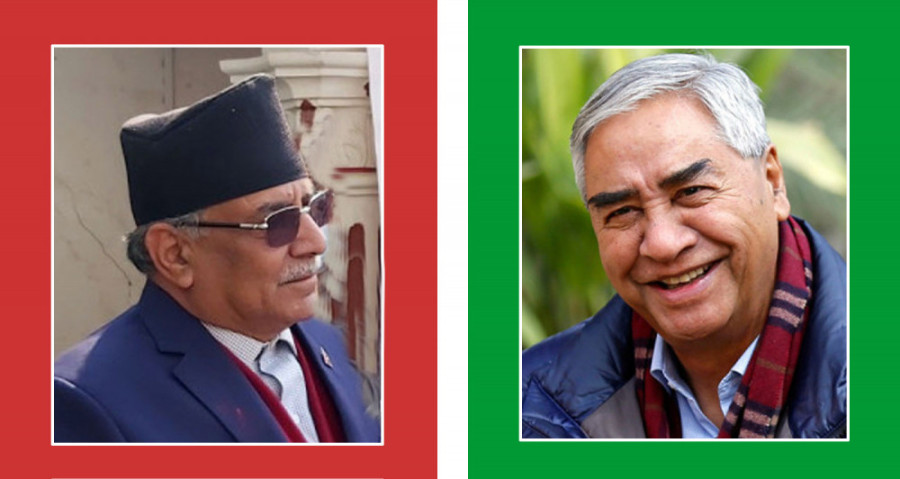Politics
Deuba, Dahal commit to saving the alliance
KP Sharma Oli has also been reaching out to other parties to build a coalition he can lead.
Anil Giri
In their first meeting after the elections to the federal and provincial legislatures, Nepali Congress President and Prime Minister Sher Bahadur Deuba and CPN (Maoist Centre) Chairman Pushpa Kamal Dahal on Saturday agreed to carry forward the ruling alliance.
With broad contours of the shape of federal and provincial parliaments becoming clear, Congress, which is leading the FPTP vote-count, and CPN-UML, which is in second, have already begun exercises to form coalitions for a new government.
No single party will have the numbers to form the federal government on its own, with both the ruling coalition and the opposition likely to fall short of the magic number of 138 lower house seats.
Deuba and Dahal have agreed to give continuity to the electoral alliance of four parties—the Congress, the Maoists, CPN (Unified Socialist) and Rastriya Janamorcha, said Bhanu Deuba, an aide to the prime minister, even as they await final results to make further decisions.
The UML has also initiated its own bid at government formation, possibly even to lead one. KP Sharma Oli, the party chairman, while congratulating Dahal on his victory in Gorkha-2, offered to work together in the future.
“Our position is clear,” said UML Deputy General Secretary Bishnu Rimal. “For the country’s stability and to end the situation of frequent government changes, Congress and UML should come together.”
If the Congress gives continuity to the existing alliance, there is no reason for us to seek an alternative but that won’t ensure political stability, Rimal told the Post. “But it is not necessary for the UML to join the government if the Congress claims leadership. In that scenario, the UML can support the government from the outside for the next five years.”
As the final results of the November 20 vote could still take some time to come out, Deuba and Dahal will sit with other leaders of the ruling alliance to discuss government formation, leaders privy to the developments said.
“When the final results are out, they will discuss the prospect of government formation at the centre as well as in the seven provinces,” said a Nepali Congress leader familiar with the meeting. As Deuba is experienced at leading coalition governments, Dahal has reportedly asked him to take the initiative to form the government.
The Maoist Centre is unhappy with the election results while the Congress is more satisfied. In 2017, the Maoists and the UML had won a thumping majority when they went to the elections under an alliance. The Congress-Maoist alliance this time is between two ideologically distant forces.
With the failure of the communist unity and the poor performance of the coalition government formed over a year ago, public dissatisfaction has benefitted two forces—the Rastriya Prajatantra Party and the newly launched Rastriya Swatantra Party—at the cost of the three major forces.
UML has been trying to create rifts in the Deuba-led alliance. Just before the polls, the party lured the Upendra Yadav-led Janata Samajbadi Party out of the five-party alliance and into its fold.
But, contradicting his party chairman’s decision to reach out to Maoist Centre Chairman Dahal, Rimal, the Deputy UML General Secretary, said, “we will not reach out to any party in the ruling alliance so long as the old alliance remains intact.”
The process of government formation will begin after the Election Commission submits the final election results to President Bidya Devi Bhandari. As per Article 76 (1) of the constitution, the President appoints the leader of a parliamentary party that commands majority in the House as the prime minister. But that is not going to happen this time because no party has the majority.
As per Article 76 ( 2), if no party has a clear majority in the House, the President appoints as prime minister a House member who can command a majority with the support of two or more parties.
The prime minister appointed under clause (2) needs to win the vote of confidence in the House within 30 days.




 8.79°C Kathmandu
8.79°C Kathmandu














